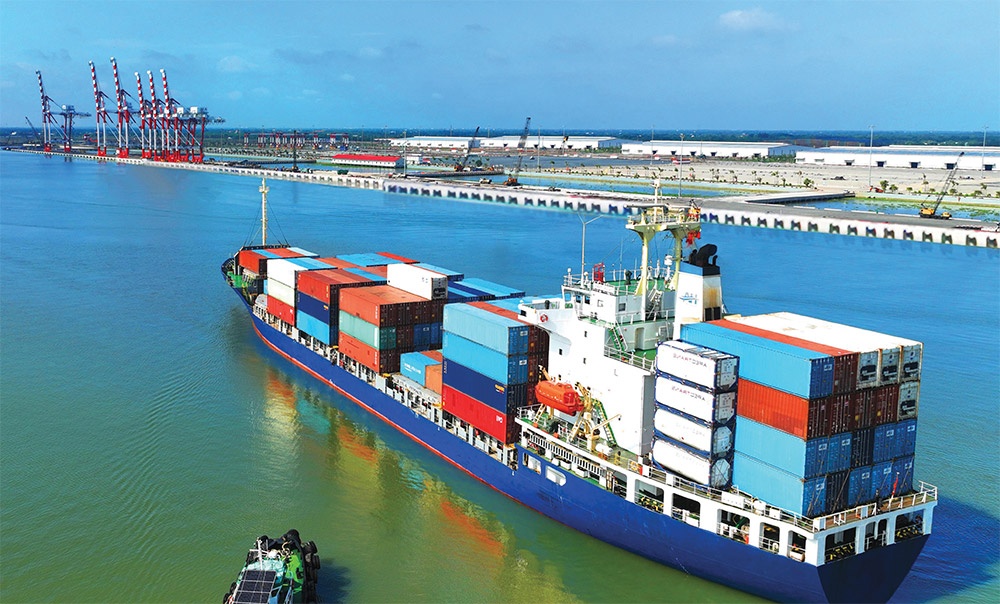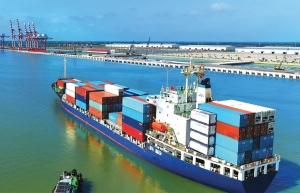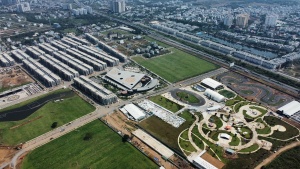Vietnam must take advantage of green logistics potential
 |
Dang Hong Nhung, a representative from the Ministry of Industry and Trade’s (MoIT) Agency of Foreign Trade, has emphasised Vietnam’s strong logistics growth and its contribution to the country’s expanding trade.
She noted at last week’s roundtable on green logistics in Ho Chi Minh City, “Vietnam ranks among the top 10 emerging logistics markets and holds the fourth position in the International Logistics Opportunity Index, showcasing the vast potential of the logistics industry in Vietnam.”
Nhung highlighted the vital role that logistics has played in Vietnam’s trade development over the last decade.
In 2010, Vietnam’s export-import turnover stood at just over $150 billion, but by 2023, it had surged to more than $680 billion - a 3.6-fold increase, she explained.
However, she also cautioned that the logistics sector is a significant source of carbon emissions and energy consumption. “According to research from the US’ Massachusetts Institute of Technology, transportation alone accounts for 8 per cent of global CO2 emissions. When warehousing is included, that figure rises to 11 per cent,” she said.
Nhung pointed out that the primary challenge is compliance with emerging environmental regulations focused on waste reduction and energy efficiency. However, she also believes that the green transition offers long-term advantages for the industry. “In the long run, adopting green practices will help businesses streamline operations, reduce costs, and unlock new business opportunities,” she stated.
Dr. Tran Thi Thu Huong, head of Logistics and Supply Chains at the University of Commerce, also spoke on the challenges facing Vietnam’s logistics sector. While the country is home to more than 34,000 logistics companies, most of these firms have limited roles within the global logistics chain.
“One of the key hurdles for logistics companies transitioning to green operations is the significant upfront investment required,” Huong said. “Green logistics will undoubtedly require considerable financial resources, which create a burden for small- and medium-sized enterprises. Many businesses struggle with deciding how to invest in greener practices.”
Infrastructure limitations further compound the issue, as Vietnam’s current systems are not fully equipped to support a shift to low-emission alternatives like inland waterways or rail transport.
From a corporate perspective, Mai Tran Thuat, CEO of Dong A Pharmaceutical Logistics, pointed out that the cost of green technology, eco-friendly packaging, and renewable energy-powered warehouses creates additional financial strain.
“For instance, we operate a 10,000-pallet warehouse that incurs electricity costs of about $8,000 per month,” Thuat explained. “This high electricity consumption significantly contributes to emissions. Switching to solar power could lower both costs and emissions, but the initial investment is substantial.”
Thuat also mentioned that although some companies could generate surplus solar power, they are not yet permitted to sell the excess, discouraging further investment. In terms of transport, cold storage trucks make up 35-45 per cent of fuel costs and are significant carbon emitters. Although electric trucks offer a cleaner alternative, none are currently available from providers in Vietnam.
To support the transition to green logistics, Thuat underscored the need for more accessible investment solutions and government policies, including tax incentives and financial aid. He also called for increased collaboration between companies pursuing green initiatives, such as renewable energy-powered industrial parks and electric vehicle fleets.
“Green logistics must be embedded in company culture, and businesses must develop a more in-depth understanding of sustainability issues and align their strategies accordingly,” Thuat said.
On the policy front, Nhung from the MoIT noted that the government is prioritising support for logistics companies transitioning to low-emission vehicles, particularly electric transport. To aid this transition, the government has introduced a three-year exemption from registration fees for electric trucks powered by batteries, followed by a 50 per cent reduction for the next two years.
Currently, the MoIT is drafting a logistics development strategy for 2025-2035, with a long-term vision for 2045. Green logistics is a central focus of this strategy, which will include measures to enhance energy efficiency. Once finalised, the ministry plans to introduce a dedicated green logistics development strategy, addressing energy use and optimising the sector for a more sustainable future.
 | Import-export recovery prompts maritime growth Marine transport companies delivered strong performances in the first six months of 2024, driven by a rebound in global trade. |
 | Vietnam's logistics sector hardest hit by Typhoon Yagi Vietnam's logistics sector was hit hard by Typhoon Yagi, with 82.4 per cent of businesses facing severe or moderate impacts, according to a new report by CEL. |
 | Vietnam SuperPort to elevate supply chain capabilities Vietnam SuperPort, a joint venture between YCH Group (Singapore) and T&T Group (Vietnam), has launched the new vision to enhance the country's logistics capabilities. Yap Kwong Weng, CEO of Vietnam SuperPort spoke to VIR's Nguyen Huong about the launch. |
What the stars mean:
★ Poor ★ ★ Promising ★★★ Good ★★★★ Very good ★★★★★ Exceptional
Related Contents
Latest News
More News
- Kurz Vietnam expands Gia Lai factory (February 27, 2026 | 16:37)
- SK Innovation-led consortium wins $2.3 billion LNG project in Nghe An (February 25, 2026 | 07:56)
- THACO opens $70 million manufacturing complex in Danang (February 25, 2026 | 07:54)
- Phu Quoc International Airport expansion approved to meet rising demand (February 24, 2026 | 10:00)
- Bac Giang International Logistics Centre faces land clearance barrier (February 24, 2026 | 08:00)
- Bright prospects abound in European investment (February 19, 2026 | 20:27)
- Internal strengths attest to commitment to progress (February 19, 2026 | 20:13)
- Vietnam, New Zealand seek level-up in ties (February 19, 2026 | 18:06)
- Untapped potential in relations with Indonesia (February 19, 2026 | 17:56)
- German strengths match Vietnamese aspirations (February 19, 2026 | 17:40)

 Tag:
Tag:




















 Mobile Version
Mobile Version